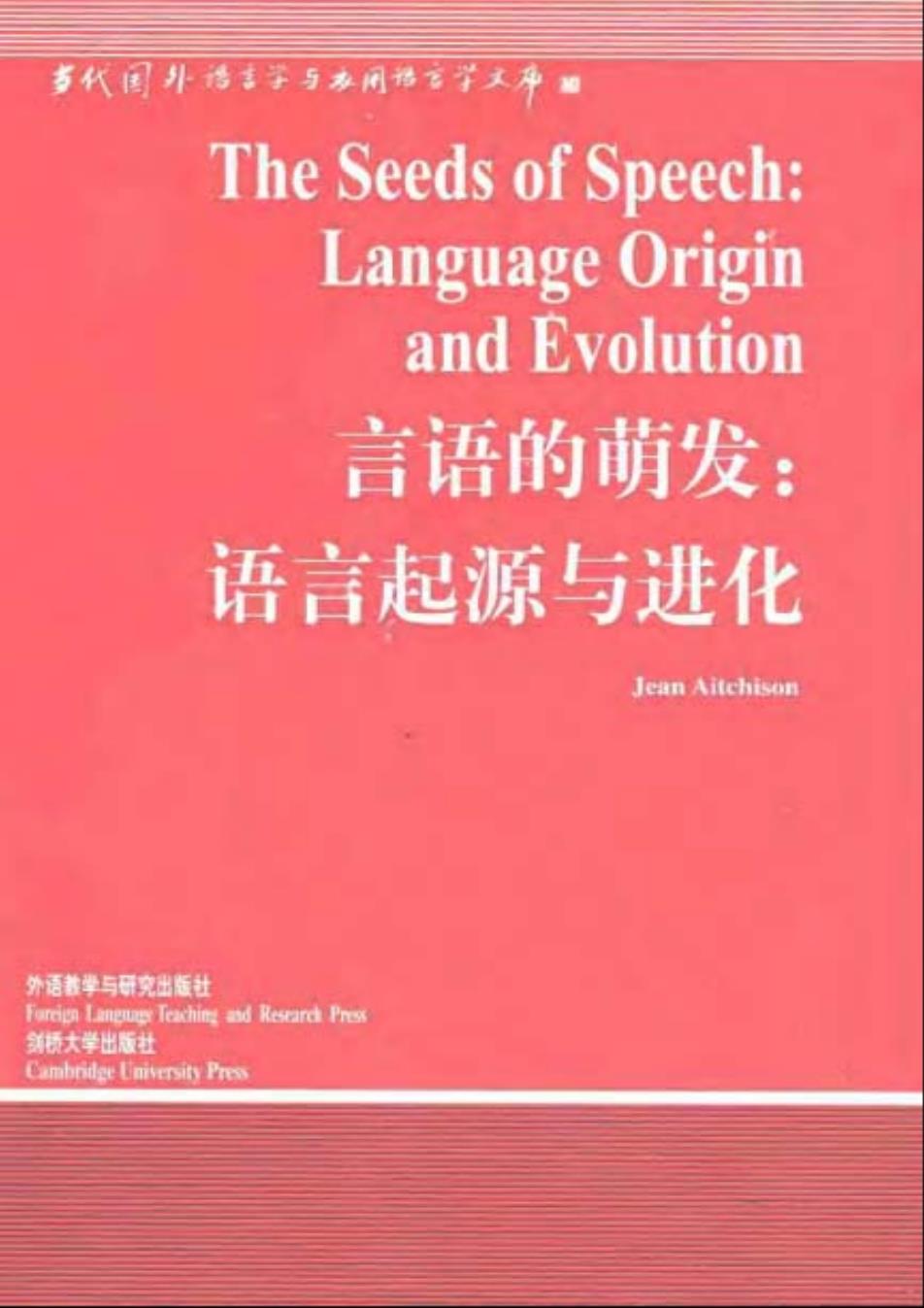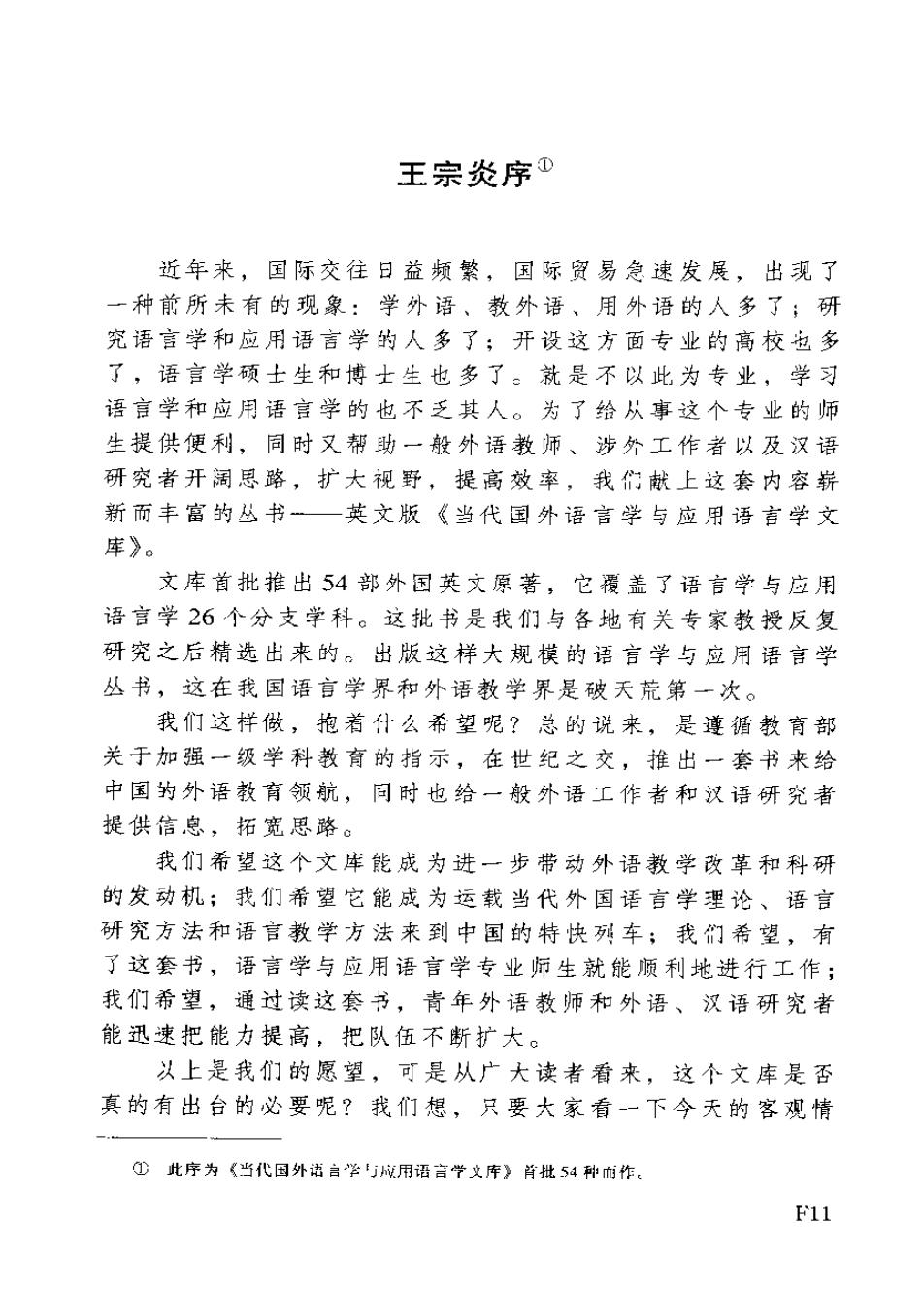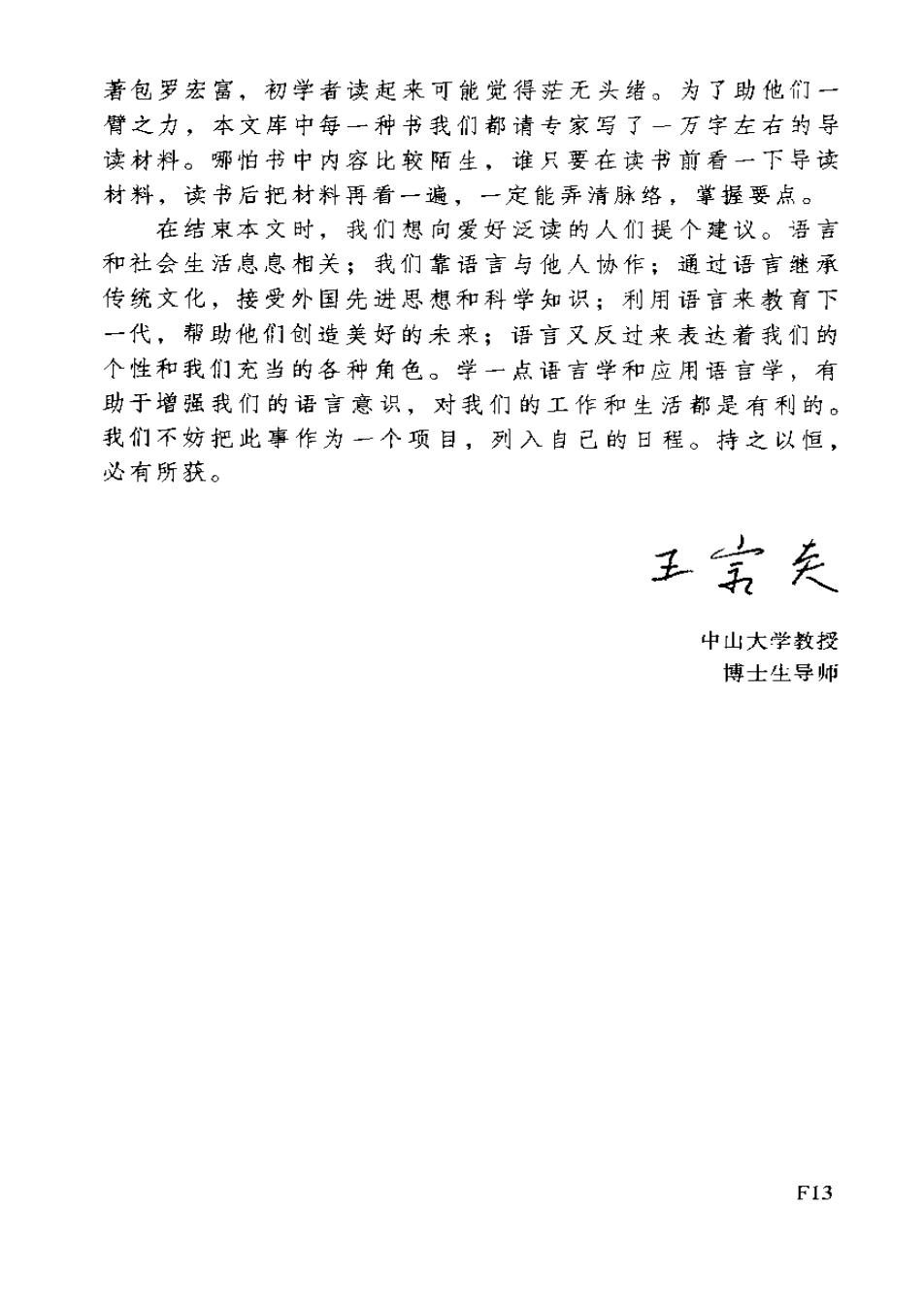
当代国外浩吉学与水网墙云学天平赠 The Seeds of Speech: Language Origin and Evolution 言语的萌发: 语言起源与进化 Jean Aitchison 外语盖拳与可究出能世 Forcign Lanen Teachin asd Resrardh Press 刻领大学出版世 Cambridge Umiversity Press

王宗炎序① 近年来,国际交往日益频繁,国际贸易急速发展,出现了 一种前所未有的现象:学外语、教外语、用外语的人多了:研 究语言学和应用语言学的人多了;开设这方面专业的高校也多 了,语言学硕士生和博士生也多了。就是不以此为专业,学习 语言学和应用语言学的也不乏其人。为了给从事这个专业的师 生提供便利,同时又帮助一般外语教师、涉外工作者以及汉语 研究者开阔思路,扩大视野,提高效率,我们献上这套内容崭 新而丰富的丛书一英文版《当代国外语言学与应用语言学文 库》。 文库首批推出54部外国英文原著,它覆盖了语言学与应用 语言学26个分支学科。这批书是我们与各地有关专家教授反复 研究之后精选出来的。出版这样大规模的语言学与应用语言学 丛书,这在我国语言学界和外语教学界是破天荒第一次。 我们这样做,抱着什么希望呢?总的说来,是遵循教育部 关于加强一级学科教育的指示,在世纪之交,推出一套书来给 中国的外语教育领航,同时也给一般外语工作者和汉语研究者 提供信息,拓宽思路。 我们希望这个文库能成为进一步带动外语教学改革和科研 的发动机;我们希望它能成为运载当代外国语言学理论、语言 研究方法和语言教学方法来到中国的特快列车;我们希望,有 了这套书,语言学与应用语言学专业师生就能顺利地进行工作; 我们希望,通过读这套书,青年外语教师和外语、汉语研究者 能迅速把能力提高,把队伍不断扩大。 义上是我们的愿望,可是从广大读者看来,这个文库是否 真的有出台的必要呢?我们想,只要大家看-一下今天的客观情 ①此序为《当代国外话言学城用语言学文库》肖批54种作: F11

况,就知道这套书有填空补缺的作用,是让大家更上一层楼的 扶梯。 我们跟许多人一样,认为国内的外语教学和语言学与应用 语言学研究是成绩斐然的,但是某些不足之处也无庸讳言。 在语言研究方面,有大量工作还等着大家去做。汉语语法 研究,过去由于结构主义的启示,已经成绩卓著,可是现在虽 则引进了功能主义,还看不出什么出色的成果。语料语言学是 新兴学科,在我国刚刚起步,机器翻译从50年代就有人搞,然 而其进展至今不能令人满意。 在语言理论方面,我们不时听到一些片面的、所见不全的 论调。有人说,1957年前西方根本没有什么理论语言学,其创 始者是Chomsky;也有人说,语言纯属社会文化范畴;还有人 说,搞语言研究只有量化方法才是科学方法,定性方法不值得 一提。 谈到外语教学,某些看法做法是分明不值得赞许的。有人 以为交际教学只管听说,不管读写,也有人以为教精读课就是 教阅读,不管口语。在分析课文时老师满堂灌,学生开口不得, 是常见的;教听力课时老师只管放录音,对学生不给半点提示 点拨,也并非罕有现象。 上述这些缺点,我们早有所知,现在我们更加明白,必须 力图改进,再也不能安于现状了。为了改进,我们就得参考国 外的先进理论,借鉴国外的有效措施。眼前这个文库,就是我 们上下求索的结果。 在编辑这个文库时,我们在两方面下了功夫。 一方面,在选书时,我门求全,求新,求有代表性和前瞻性。 我们不偏爱一家之言,也不只收一家外国出版社之书。语言学与 应用语言学的主干学科固然受到了应有的重视,分支学科可也不 忽视。语料语言学、语言统计学是新兴学科,我们收入了专著;句 法学、语义学久已有人研究,我们也找到了有关的最新著作。 另一方面,我们邀请了国内知名的博士生导师、硕士生导 师为各书撰文导读,为读者铺平道路。语言学和应用语言学专 F12

著包罗宏富,初学者读起来可能觉得茫无头绪。为了助他们一 臂之力,本文库中每一种书我们都请专家写了一万字左右的导 读材料。哪怕书中内容比较陌生,谁只要在读书前看一下导读 材料,读书后把材料再看一遍,一定能弄清脉络,掌握要点。 在结束本文时,我们想向爱好泛读的人们提个建议。语言 和社会生活息息相关;我们靠语言与他人协作;通过语言继承 传统文化,接受外国先进思想和科学知识;利用语言来教育下 一代,帮助他们创造美好的未来;语言又反过来表达着我们的 个性和我们充当的各种角色。学一点语言学和应用语言学,有 助于增强我们的语言意识,对我们的工作和生活都是有利的。 我们不妨把此事作为一个项目,列入自已的日程。持之以恒, 必有所获。 王宝关 中山大学教授 博士生导师 F13

Preface by Chomsky It is about half a century since the study of language undertook a rather new ccurse,while renewing some traditional concerns that had long been neglected.The central change was a shift of attention from behavior and the products of behavior (texis,corpora,etc.to the internal mcchanisms that enter into behavior.This was part of a general shilt of perspective in psychology towards what became known as "cognitive science,and was in fact a significant factor in contributing to this development. With this departure from prevailing structuralist and bchavionst approaches,the objcct of inquiry becomes a property of individual persons, my granddaughters for example.We ask what special properties they have that underlie an obvious but noncthelcss remarkable fact.Exposed to a world of "buzzing,booming confusion"(in William James's classic phrasc),each instantly identified some intricate subpart of it as linguistic,and reflexively, without awarencss or instruction which would be useless in any event), performed analytic operations that led to knowledge of some specific linguistic system.in one case,a variety of wha:is called informally "English,"in another a variety of "Spanish.It could just as casily been one of the Chinese languages,or an aboriginal language of Australia,or some other human language.Exposed to the same environment,their pet cats (or chimpanzees, ete.would not even take the first step of identifying the relevant category of phenomena,just as humans do not identify what a bee perceives as the waggle dance that communicatcs the distance and orientation of a source of honey. All organisms have special subsystems that lead them to deal with their environment in specific ways.Some of these subsystems are called "mental" or "cognitive,"informal designations that need not be made precise,just as there is no need to determine exactly where chemistry ends and biology begins.The development of cognitive systems,like others.is influenced by the environment,but the general course is genctically determined.Changes of nutrition,for example,can have a dramatic offect on development,but will not change a human embryo to a bee or a mouse,and the same holds for cognitive development.The cvidence is strong that among the human cognitive systems is a "faculty of language"(FL),to borrow a traditional term:some subsystem of mostly the brain.The cvidence is also overwhelming that apart from severe pathology,FL is close to uniform for humans:it is a genuine species property.The "initial state"of FL is determined by the common human genctic endowment.Exposed to experience,FL passes through a series of statcs,normally reaching a relatively stable state at about puberty,after which changes are peripheral: growth of vocabulary,primarily. F14